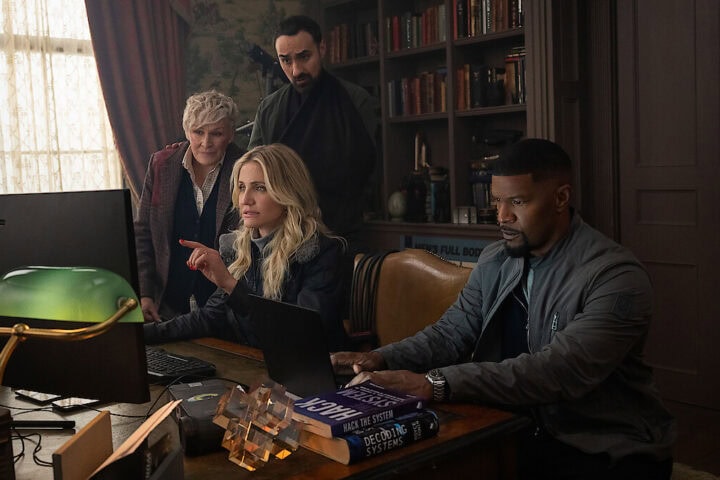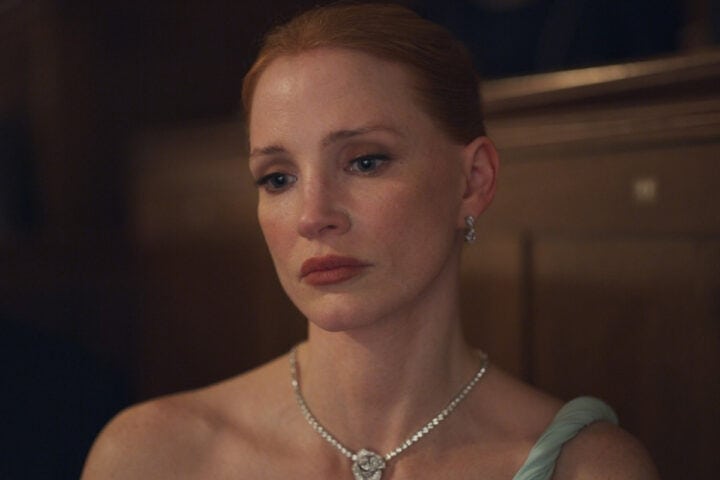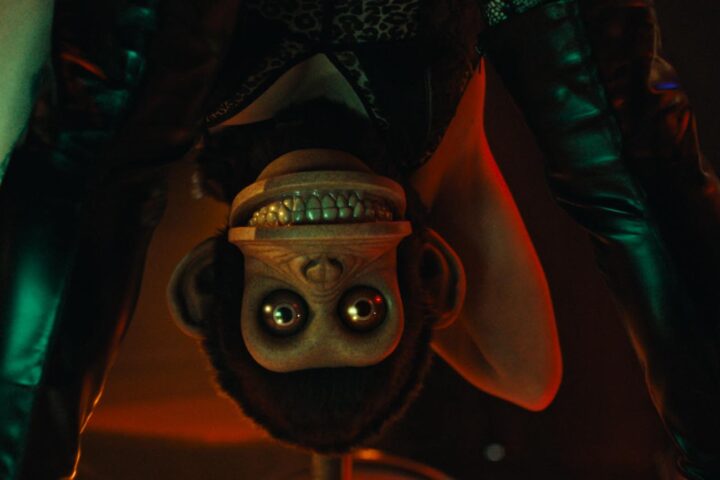When does an artist die? Richard Linklater’s Blue Moon opens with a direct answer as it pertains to its subject, famed American lyricist Lorenz Hart (Ethan Hawke), as he stumbles drunkenly to the ground of a Hell’s Kitchen alleyway in November 1943. Then a radio announcer’s voiceover narration dutifully provides the key bullet points of Hart’s accomplishments as if to clear the decks before audiences get the actual answer.
Blue Moon captures the death of an artist as only Linklater could by fixating on a moment perpendicular to Hart’s passing. Seven months before his collapse at just 48 years old, a single night at the famed Broadway haunt Sardi’s led to the devastating realization that both the culture and his collaborators had left him behind. Surrounded by portraits of the industry’s brightest talents, the space becomes like a mausoleum to Hart as he frets about how his legacy will inevitably be flattened like one of the restaurant’s famed line-drawing caricatures.
It’s the opening night of Oklahoma!, for which Richard Rodgers (Andrew Scott), Hart’s former composing partner, has turned to the wordsmithing talents of Oscar Hammerstein II (Simon Delaney). Hart can sense the tide turning against him as the American musical theater moves in the more crowd-pleasing direction indicated by the new show’s exclamation-point-laden title. The embittered writer leaves before the curtain call and haunts the afterparty like a ghost.
From there, Blue Moon never leaves Sardi’s. Though he didn’t write the film’s screenplay, it’s not hard to see what attracted Linklater to the story, given the degree to which it lingers in a specifically bracketed liminal period. Here, that’s when a work passes ownership from the artist to the audience. As the critical reviews roll in over the phone, there’s a steady drumbeat reminding the creators of their tenuous control over the art over which they labor.
In this purgatory, the grandiloquent Hart regales the bartender (Bobby Cannavale), the pianist, and anyone else in earshot about his feelings on the state of the art. These ramblings paint the portrait of a man who can see his function as both tragic hero and comic jester to those around him. Screenwriter Robert Kaplow pays the truest tribute to his subject by giving the film over to his long-winded musings for extended durations. Blue Moon, like Hart in his day, trusts that audiences want to engage with subjects that matter through deliberate dialogue.
If the film never descends into verbosity or staginess, it’s because of how much feeling Hawke pumps into each line. The actor has been Linklater’s surest on-screen collaborator for three decades running, and it’s clear that he shares the same proclivity for philosophizing about the nature of art and commerce. This sage disposition pours achingly into Hart, be it through a bon mot, a barbed insult, or a bruised expression washing over his face.
Hart’s complaints about the infantilization of music at the whims of an undiscerning populace take up a lot of space in Blue Moon, yet the film amounts to more than just a screed. The alcoholic author has enough clarity to recognize that plenty of his existing success stems from the same simplistic sensibility. A running joke taunts Hart with the titular song, which boasts the ignominious distinction of containing his self-professed worst lyrics…but marking his greatest popular success. Some spontaneous singing breaks out to the tune later in the film, and even Hart isn’t immune to the appeal of seeing people connect with music they find meaningful.
Hart cannot bring himself to see the newly formed duo of Rodgers and Hammerstein as villains, and neither does Blue Moon. They’re not mere stand-ins for the perils of populist art within Linklater’s film. Despite all the congratulations he receives during the party (all of which only manage to mention how big a hit Oklahoma! will be), the composer makes an impassioned and convincing plea for the show’s merit. As Hart lambasts the musical’s imaginary Americana for not offering anything to servicemembers during wartime, Rodgers professes the power of audiences recognizing genuine emotion underneath the corn and cheese.
It’s not just about the output of the creative process for Rodgers. The nature of input matters. He branched out to Hammerstein for a dependable collaborator as much as for a new artistic direction. Like most of the world, Rodgers appreciates the brilliance of Hart’s lyrics, though he’s more perceptive at recognizing their limits. To sustain a fruitful career in the arts, he needs the same spirit of soulfulness and humanity in his colleagues that he seeks to invoke with his music.
Blue Moon proves the immortal genius of Rodgers by embodying both the Hart and Hammerstein models of artistic engagement within the film. The script isn’t above a little fan service with a Midnight in Paris-style parade of cameos from E.B. White, George Roy Hill, and an adolescent Stephen Sondheim. That quippy wit most frequently spouted by Hart ultimately gives way to deep sadness, especially as he comes to grips with another flailing relationship—this one of a personal nature with college student Elizabeth Weiland (Margaret Qualley).
Linklater’s films rarely possess traditional narrative climaxes, and the closest Blue Moon gets to one is Elizabeth’s extended monologue recounting a recent romantic dalliance with one of her classmates. This moment is also the closest thing the film has to a Hart-like touch. It trusts us to digest each carefully chosen word and appreciate the thematic relationship that Elizabeth’s yarn has to Blue Moon at large. The sincerity of the sequence is disarming, but it can’t rival the sardonic snark of Hart when it comes to proving out his intelligence. Perhaps the lyricist himself would chuckle at the irony. A film lionizing his loquaciousness stumbles on those grounds, yet it still manages to succeed thanks to the force of personality that ushered in his demise.
Since 2001, we've brought you uncompromising, candid takes on the world of film, music, television, video games, theater, and more. Independently owned and operated publications like Slant have been hit hard in recent years, but we’re committed to keeping our content free and accessible—meaning no paywalls or fees.
If you like what we do, please consider subscribing to our Patreon or making a donation.




